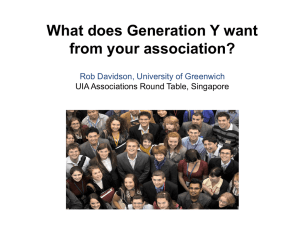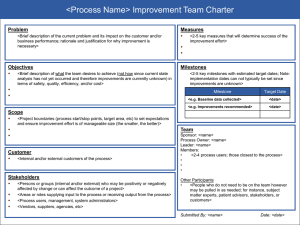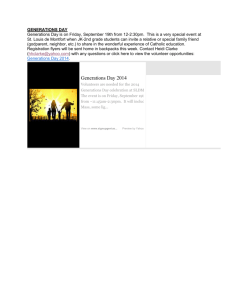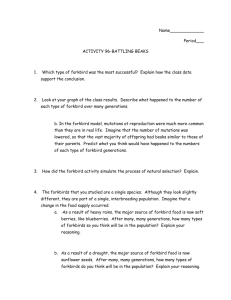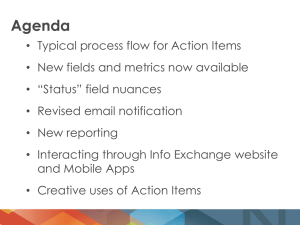Faith-Crises of Women in Generation Y
advertisement
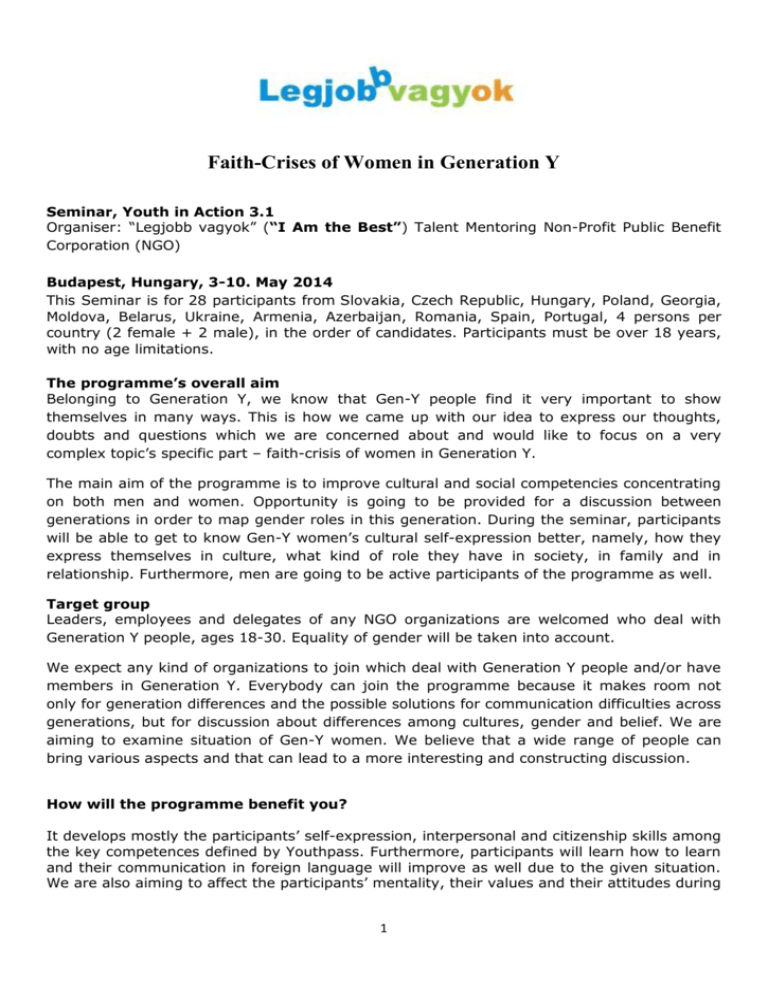
Faith-Crises of Women in Generation Y Seminar, Youth in Action 3.1 Organiser: “Legjobb vagyok” (“I Am the Best”) Talent Mentoring Non-Profit Public Benefit Corporation (NGO) Budapest, Hungary, 3-10. May 2014 This Seminar is for 28 participants from Slovakia, Czech Republic, Hungary, Poland, Georgia, Moldova, Belarus, Ukraine, Armenia, Azerbaijan, Romania, Spain, Portugal, 4 persons per country (2 female + 2 male), in the order of candidates. Participants must be over 18 years, with no age limitations. The programme’s overall aim Belonging to Generation Y, we know that Gen-Y people find it very important to show themselves in many ways. This is how we came up with our idea to express our thoughts, doubts and questions which we are concerned about and would like to focus on a very complex topic’s specific part – faith-crisis of women in Generation Y. The main aim of the programme is to improve cultural and social competencies concentrating on both men and women. Opportunity is going to be provided for a discussion between generations in order to map gender roles in this generation. During the seminar, participants will be able to get to know Gen-Y women’s cultural self-expression better, namely, how they express themselves in culture, what kind of role they have in society, in family and in relationship. Furthermore, men are going to be active participants of the programme as well. Target group Leaders, employees and delegates of any NGO organizations are welcomed who deal with Generation Y people, ages 18-30. Equality of gender will be taken into account. We expect any kind of organizations to join which deal with Generation Y people and/or have members in Generation Y. Everybody can join the programme because it makes room not only for generation differences and the possible solutions for communication difficulties across generations, but for discussion about differences among cultures, gender and belief. We are aiming to examine situation of Gen-Y women. We believe that a wide range of people can bring various aspects and that can lead to a more interesting and constructing discussion. How will the programme benefit you? It develops mostly the participants’ self-expression, interpersonal and citizenship skills among the key competences defined by Youthpass. Furthermore, participants will learn how to learn and their communication in foreign language will improve as well due to the given situation. We are also aiming to affect the participants’ mentality, their values and their attitudes during 1 the seminar; that could effect change in their communication, their behaviour and their attitudes. Thematic We find the following six topics very important to speak about and experience them through different exercises and trainings during the week. Traditions – nations, examples, approaches Generational cooperation Partnership - family The Gen-Y mothers Me, as a woman Summing-up: defining the term ‘Gen-Y women’ Costs Food and accommodation are fully covered by Youth in Action Programme. Transportation will be covered to 70% of the total costs using the cheapest means available. cost of visas are also covered, please inform us, if is needed. Contact: András Hintya Hintya.andras@legjobbvagyok.hu +3670-6186822 [INFO PACK] Faith-Crises of Women in Generation Y The programme’s aim Belonging to Generation Y, we know that Gen-Y people find it very important to show themselves in many ways. This is how we came up with our idea to express our thoughts, doubts and questions which we are concerned about and would like to focus on a very complex topic’s specific part – faith-crisis of women in Generation Y. The main aim of the programme is to improve cultural and social competencies concentrating on both men and women. Opportunity is going to be provided for a discussion between generations in order to map gender roles in this generation. During the seminar, participants will be able to get to know Gen-Y women’s cultural self-expression better, namely, how they express themselves in culture, what kind of role they have in society, in family and in relationship. Furthermore, men are going to be active participants of the programme as well. Why is it worth to participate in this programme? 2 It is worth to participate in this programme because faith-crisis is a current phenomenon, and lack of intimacy and commitment, which is also very typical for Gen-Y people, can cause difficulties not only at workplace, but in relationship and having children as well. In spite of that, literature does not pay enough attention to this topic. It would be really essential to deal with all questions and expectations arising from Gen-Y women; both at the individual level (identity, femininity, ideal-actual self-discrepancy) and at the societal level (traditional female role, women at work, maternity leave etc.), since they are an important part of ACTIVE young adults. Therefore, an increased attention needs to be paid to them in order they can be role models for their children as women, mothers and employees. But that needs stable (female) identity. In this regard, it is worth focusing on their internal difficulties, their inner struggles, their role conflicts and how these problems and conflicts can be resolved. Furthermore, the topic is going to be examined from the aspect of family rather than the aspect of their roles in the workplace. Of course, men are going to be a crucial part of this examination, since a full review of the topic would not be possible without their view on it. Another current topic is that young people are getting married and having children increasingly later. It is crucial to pay increased attention to these phenomena`s societal and individual reasons and effects. In our mentoring programme, which deals with youth, a question always arises, namely when competence development and talent mentoring should be started. Our answer is always that it might be `late` even in the kindergarten. The main aim of the programme is to improve cultural and social competencies concentrating on both men and women. Opportunity is going to be provided for a discussion between generations in order to map gender roles in this generation. During the seminar, participants will be able to get to know Gen-Y women’s cultural self-expression better, namely, how they express themselves in culture, what kind of role they have in society, in family and in relationship. Furthermore, men are going to be active participants of the programme as well. Target group Leaders, employees and delegates of any NGO organizations are welcomed who deal with Generation Y people, ages 18-30. Equality of gender will be taken into account. We expect any kind of organizations to join which deal with Gen-Y people and/or have members in Generation Y. Everybody can join the programme because it makes room not only for generation differences and the possible solutions for communication difficulties across generations, but for discussion about differences among cultures, gender and belief. We are aiming to examine situation of the Gen-Y women. We believe that a wide range of people can bring various aspects and that can lead to a more interesting and constructing discussion. How will the programme benefit you? It develops mostly the interpersonal and citizenship skills among the defined key competences. During the training, participants will learn how to learn and their communication in foreign language will improve as well due to the situation. All exercises which will be done during the training can enhance the participants’ self-expression skills as well. But facilitating active social participation means much more than improving social skills. We are also aiming to affect the participants’ mentality, their values and their attitudes in this week. It could effect change in your communication, your behaviour and your supposition. 3 We find the following six topics very important to speak about and experience them through different exercises and trainings during the week. 1.1. Traditions – Nations, Examples, Approaches Hungary and the Rest of the World West – East Gender roles in different countries Living traditions Loyalty to traditions 1.2. Generational cooperation Influence of male gender roles (father, grandfather, brother) on life of Gen-Y women Influence of female gender roles (mother, grandmother) on life of Gen-Y women Delayed motherhood = extended grandparenthood. Where does it lead to? 1.3. Relationship - Family a) Relationship Distribution or redistribution of gender roles Is marriage an outdated institution? o Why do not Gen-Y people get married and why do the others? Difficulties in making commitment and building intimacy o Advantages and disadvantages of lack of commitment How does a woman’s professional success affect the relationship? What is an ideal man for a Gen-Y woman like? b) Family Can a family be complete without having children? (Is it an external expectation or an internal need?) Youth tend to leave home later: educational expansion vs. having children increasingly later Distribution or redistribution of parent roles What kinds of family models are common these days? o New family models: patchwork, single parent. Divorce in Generation Y o How does divorce affect female gender roles? Do the single parents need to fulfil the other’s roles and functions, too? o What do youth in rural and urban area think about divorce? 1.4. The Gen-Y mothers What are the conditions for having children for Gen-Y women? o Is intrinsic motivation (desire for a child) or extrinsic motivation (economic and social situation) the determining factor in childbearing decisions? What is a good Gen-Y mother like? o Is it enough to be a ’good-enough mother’ or is it a must to be a perfect one? 4 o Women’s and men’s points of view on what a good Gen-Y mother is like? Being a mother in the capital town and the countryside The pressure of the ages and the generations on the Gen-Y women to have children o Does everybody really want to be a mother? What kind of reaction does it elicit, if someone openly has a strong view that she does not want to have any children? Relation of femininity and motherhood – Is a mother not a woman anymore? o The role of mother in femininity, in Generation Y o Can the role of mother fulfil femininity, women identity? o Can you be satisfied being ‘just’ a mother? Post-partum depression (a role conflict or a crisis) and other psychological problems after childbearing What kind of roles do men play in childbearing? o Can fathers choose to stay at home with children as well or is it only the mothers’ job? 1.5. ME, as a woman The Gen-Y women`s view on female roles (boss, girlfriend, child, mother, wife) o What are the most typical female role conflicts for youth today? What makes a woman woman? o Does youth define the term of woman only by appearance or internal qualities as well? Which is rather typical? What if you fail to be an ideal woman? o How can self-discrepancy be resolved? o How can an ideal woman be a real one? How do men view about women? 1.6. Summing up: Defining the term of Gen-Y women What kind of milestones do the Gen-Y women set? o What and do they want to achieve and by which age? o Are these milestones set by intrinsic motivation or rather external pressure? o Where do these milestones, these goals come from? What are the underlying principles? o Can these milestones be changed easily? o How these goals fit to everyday life? Do they work towards their goals that have been set? o Are difficult situations relevant or irrelevant regarding to the goal during the achieving process? o Advantages and disadvantages of setting milestones What about Gen-Y women who do not set any milestones? o How consciously do they plan for future? o Advantages and disadvantages of this attitude The Gen-Y women from men`s point of view 5
